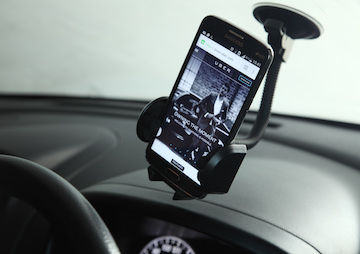California Labor Commission Officially Calls Uber Driver an Uber Employee
A California labor agency has determined that, at least in one instance, an Uber driver is actually an employee of the company, not an independent contractor who happens to rely on Uber-provided information to drive her business. But what does this mean for the ride-sharing behemoth? (eskay / Shutterstock.com)
(eskay / Shutterstock.com)
A California labor agency has determined that, at least in one instance, an Uber driver is actually an employee of the tech company, not an independent contractor who happens to rely on Uber-provided information to drive her business. But what does this mean for the ride-sharing behemoth?
Clearly this case, Uber v. Berwick, represents bad news for Uber, which is reflected in the corporation’s swift move to appeal the California Labor Commission’s decision, as TechCrunch noted in a post Wednesday.
Here’s more on the disruption of a Silicon Valley disruptor from The New York Times:
The ruling, made in March, came to light after Uber filed an appeal Tuesday evening. The ruling ordered the company to reimburse Barbara Ann Berwick, a former Uber driver, $4,152.20 in expenses and other costs for the period when Ms. Berwick worked as a driver.
Uber has long positioned itself as a “logistics company,” an app that drivers and passengers use merely to facilitate private transactions, and not a transportation fleet with tens of thousands of employee drivers. The company argued it did not exert any control over the hours its drivers worked and did not require drivers to complete a minimum number of trips, according to the court filing.
But the Labor Commission cited many instances in which it said Uber acted more like an employer. The ruling noted that Uber provided drivers with phones and had a policy of deactivating its app if drivers were inactive for 180 days.
[…] Classifying Uber’s drivers as employees may turn out to be an even bigger roadblock to the company’s business than regulatory changes because it could change Uber’s cost structure, requiring it to offer health insurance and other benefits, as well as paying salaries. On-demand companies have been premised on the idea that people who find piecemeal work through these online marketplaces are freelancers, not employees entitled to costly benefits.
–Posted by Kasia Anderson
Your support is crucial…With an uncertain future and a new administration casting doubt on press freedoms, the danger is clear: The truth is at risk.
Now is the time to give. Your tax-deductible support allows us to dig deeper, delivering fearless investigative reporting and analysis that exposes what’s really happening — without compromise.
Stand with our courageous journalists. Donate today to protect a free press, uphold democracy and unearth untold stories.









You need to be a supporter to comment.
There are currently no responses to this article.
Be the first to respond.